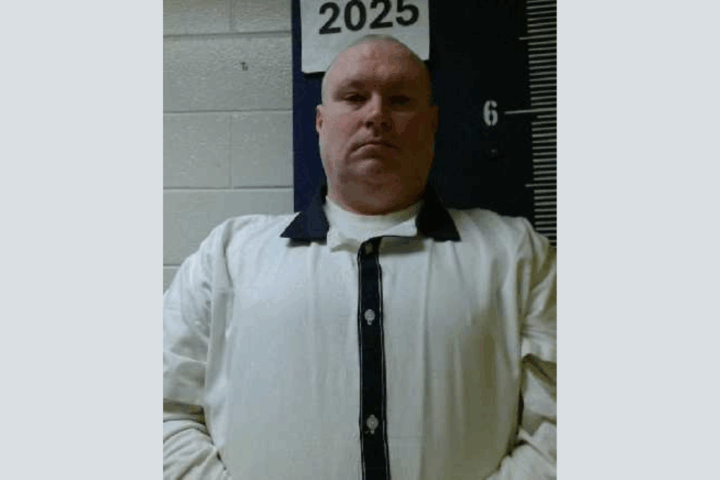The following article is a firsthand account of a full day in Tattnall County Superior Court.
With three state correctional facilities in the county the backlog of prison-related felony cases has only been exacerbated by the COVID-19 pandemic.
The increasingly high volume prompted the Atlantic Judicial Circuit to earmark a portion of the ARPA funds recently awarded from the federal government to bring in a senior judge and law clerk to assist in moving cases. A team of ADAs has been assigned to handle all cases with a nexus to the Georgia Department of Corrections.
Over the last few months, the court has scheduled full days dedicated to these cases alone, with parties securing plea deals, holding pre-trial proceedings, and gearing up for jury trials, which are set to begin in February.
Tuesday, January 25, 2022
9:00 a.m. – Inmates are being organized, meeting with attorneys, GDC is coordinating with the Department of Community Supervision and Tattnall County deputies to ensure everything is streamlined. Prosecutors bring in eight storage bins of files.
10:00 a.m – Superior Court begins with Senior Judge David Cavender. ADA Joe Skeens of the Atlantic Judicial Circuit District Attorney’s Office is representing the state. 25 cases are on the calendar, all of them involving current and former inmates with the Georgia Department of Corrections (GDC). These alleged offenses occurred during their time of incarceration.
All but one are represented by public defenders. Many of Tuesday’s cases stem from a 2019 riot at Smith State Prison, which has 29 defendants. To avoid conflicts of interest, conflict defenders from around the state were pulled in to ensure adequate legal representation for all of the accused. One other defendant is ‘pro se,’ or representing himself.
Some appear via video conference while others are present in the courtroom. A handful of offenders have been transported from GDC facilities to the courthouse to appear, notably if they are planning to enter a plea.
A bondsman, a probation officer from the Georgia Department of Community Supervision, and a GDC Criminal Investigations Division Agent are also present.
While cases are traditionally prioritized by offense date and case age, Senior Judge William Woodrum previously prioritized these cases by possible GDC release date and whether or not the offender is currently housed in the Tattnall County Jail, a practice which has proven to be a strain on the county jail and substantial burden on local taxpayers.
A few of the offenders on the calendar are not present due to COVID-19 exposure or testing positive for COVID-19.
Public Defenders Stephen Yekel and Brandon Clark appear on behalf of several of the names called. They announced to the court that they’re either awaiting a plea offer from the state or ready for trial.
The 7th offender to be called is represented by a conflict defender who has only been assigned the case for a month. She has not met her client, who is not present due to his detention in Walton County on new charges. The case is continued until the next calendar to allow time for the attorney to familiarize herself.
#8 & #9 are co-defendants, each with an appointed attorney. They’re facing Felony Murder and Aggravated Assault Charges, but still need evidence from the state. The case is continued, though the state pushes for action on the next calendar because one defendant is slated to be released in August 2022.
#10 is one of five co-defendants in an incident that is tentatively set for trial in June 2022. The state announces that it intends to try them together.
Q.E. is the 11th offender to be called. He is in the Tattnall County jail while his court appointed attorney appears remotely. Q.E. is in a unique situation because he was serving time for Aggravated Assault, Aggravated Battery, and Burglary at Smith State Prison in June 2019 when he allegedly participated in a riot – one of 29 defendants charged in the incident. Q.E. is charged for his use of a sharp object to attack another inmate to elevate his rank in a gang.
Because the Board of Pardons & Paroles did not verify if Q.E. had new charges while incarcerated, Q.E. was released on July 3, 2019. He’s been under state supervision, working in Sandersville, and living in Jefferson County with his girlfriend and her child since he was released. He’s held a full-time job and financially supported the three of them…until he was picked up on an outstanding warrant in January 2022. A special grand jury presentment on additional charges from the riot triggered a bench warrant for Q.E.
He appeared in Tattnall County Magistrate Court on January 20, but no bond was set so his attorney asks that a bond be set today. Q.E. is brought over from the jail in his jumpsuit and shackles. The jail officers place him in front of the camera so he can be introduced to his attorney. Judge Cavender agrees to set bond $4,000 cash or $8,000 property bond. ADA Joe Skeens requests the court bar Q.E. from having contact with anyone who is affiliated with the Gangster Disciples, which is granted.
#12 is out on bond but cannot appear, as his car reportedly broke down in Atlanta. His bail bondsman is present and announces to the court that he has spoken to the defendant and his mother and can vouch for his whereabouts.
#13 is another charged in the Smith State Prison riot from June 2019. He is due to be released from GDC in March 2022, so the court is working expeditiously to try to resolve the case. He is not present for the calendar call, nor is his conflict defender on record. The conflict defender is based in Southwest Georgia and no one from the court has been able to reach him since December.
The attorney for #14 appears remotely from Atlanta. He tells the court he is conducting his own investigation and plans on requesting a hearing to seek immunity for his client, who has been released from GDC and awaits trial without bond in the Tattnall County jail.
#15 appears pro se, or on his own behalf and without an attorney. ADA Joe Skeens brings the court up to date on which rights the defendant was apprised of during the last calendar call and that Judge Woodrum emphasized the importance of having an attorney. Judge Cavender echoes those sentiments and tells the defendant it’s “not a good idea to go to trial without a lawyer.” The defendant replies “Yes, sir” and the case is set for the next calendar.
It’s 11:15 a.m. when #16 is brought in by the GDC CERT officers. These officers are dressed in tactical vests with additional equipment. One officer is on each side of #16, holding an arm that is shackled to his waist. They place him at the podium next to his public defender and stand behind him for the duration of the proceeding. He is charged in the Smith State Prison riot of 2019, specifically for refusing to go into his cell at the direction of COs and for criminal damage to property, which endangered human life when he threw a television.
The Clerk of Court places him under oath and the judge reads him his rights. He enters a guilty plea. When asked ‘Why’d you do that?’ by the judge, #16 answers, “I don’t know.” Judge Cavender accepts the plea agreement and sentences #16 to ten years on the first charge, two of which are to be served in prison and the remaining eight on probation. He will receive credit for time served, commencing today. On the second charge, he is sentenced to serve two years on probation, concurrent to the first sentence, and pay $264 in restitution to the State of Georgia. The CERT officers take the defendant by the arms so he can meet with a probation officer.
#17 is not present, but his private practice attorney is. He tells the court that a plea has been offered by the state but he needs time to discuss it with his client, who remains in GDC custody. The case is continued until the next calendar.
At 11:35 a.m., the court takes a brief recess for the ADA to iron out the details of another plea agreement.
11:45 a.m. – #18, an inmate who escaped from a work detail at Rogers State Prison in 2019 appears in his orange jumpsuit. He’s been in the Tattnall County Jail since his max out date and release from GDC. He’s now charged with Escape and Criminal Attempt to Commit a Felony (that being attempting to coordinate a contraband drop). #18 enters a guilty plea and Judge Cavender sentences him to 7 years probation with 120-180 in a PDC for the Escape charge and two years probation, concurrent to Count 1, for the second charge. ADA Joe Skeens asked that he be banished from the Atlantic Judicial Circuit as well, which encompasses Bryan, Evans, Liberty, Long, McIntosh, and Tattnall counties.
11:55 a.m – Court recesses for lunch and will reconvene at 1:00 p.m.
1:00 p.m – #19 appears with his public defender to enter a plea. He’s charged with unlawful acts in a penal institution and fighting at Smith State Prison, where he is serving time for Armed Robbery. He is sentenced to 10 additional years, three of which will be in prison and the remaining on probation. He is also banished from the Atlantic Judicial Circuit, though the public defender asks that the sentencing order stipulate #18 can travel through via I-16 and I-95. Skeens agrees, but tells the defendant, “Make sure you have plenty of gas.”
#20 is asking for a bond from Tattnall County Jail. He completed his sentence for Armed Robbery and Aggravated Assault and is under state supervision for the next ten years, but is charged with Aggravated Sodomy of a person by force and Aggravated Assault with a knife from his time in GDC custody. The judge sets bond at $40,000 cash or $80,000 bond and prohibits #20 from contacting his victim. The state and the court are unsure if the alleged victim is still in GDC custody or has been released himself.
It’s now 2:00 p.m.. Two pretrial matters are scheduled for a murder case that is tentatively scheduled for jury trial in February – an Immunity Hearing and 404(b) hearing.
In State v. Shawn Mosley, Mosley is accused of killing his cellmate, Adrian Victerro White, in the Tier II lockdown dorm of Georgia State Prison on December 3, 2019. An altercation occurred in the cell and White was stabbed with a sharp object, leaving him with wounds to his face, chest, back, and arm. He bled out on the floor of the cell.
Mosley’s attorney, Mitchell Albert III out of Atlanta, contends that Mosley should be immune from prosecution because he acted in self-defense. [Read about the standards for immunity here]. Albert contends that only two people know what happened in the cell that day, but in an immunity hearing, the burden is on the defendant to prove that it was ‘more likely than not’ that the act was self defense.
The defense begins to make its case and a current GDC inmate is transported to testify, however, when the questions begin, the inmate only replies that he cannot recall any of the incidents mentioned and that he does not recognize the defendant.
Shawn Mosley takes the stand to share his account of the incident. He testifies that his cellmate, Adrian White, was like a brother to him and they never had any issue until the day of White died. Mosley says White had been under the influence of drugs for several days, causing him to hallucinate and show both rage and paranoia. White was in possession of a shank, he says, and the scuffle began when White attacked Mosley while he was laying on his bed. He says he was stabbed in the eye, the hand, the leg, and the back. White also headbutted him, causing his nose to ‘gush blood everywhere.’ They fought around the entire room before Mosley took control of the shank and used it against White, he testifies.
Mosley says he had no reason to kill White when he was about to be released from the lockdown dorm and released into General Population. He also had a parole date after serving 15 years in different prisons, including Macon State and Ware State before he arrived at GSP. “I feared for my life, I didn’t know what else to do,” he tells the Court., noting that he’d only been in six fights during his 15 years.
On cross examination by ADA Joe Skeens, Mosley is pressed on why he didn’t slip a note to a CO and seek protective custody, as many do. Mosley says he was told by an orderly that they were short staffed and that ‘ain’t nobody coming.’ He also said it would put him at risk if anyone noticed.
Skeens asks about the Tier II program, which is a disciplinary dorm, and how Mosley ended up there. Mosley tells him it was because he had a cell phone when he was at Ware State Prison followed by an issue with a CO, which prompted him to be transferred to GSP. Skeens then asks Mosley if his transfer had anything to do with a cellmate.
Skeens: Do you know an inmate named Dennard Brown?
Mosley: I don’t recall someone by that name.
Skeens: You don’t recall Inmate Dennard Brown?
Mosley: I don’t know someone by that name.
Skeens: Do you recall stabbing your cellmate, Inmate Dennard Brown, at Ware State Prison in February 2019, and being charged for the offense?
Mosley’s counsel objects, saying the line of questioning is not relevant and the state is engaging in a ‘fishing expedition.’ Skeens tells Judge Cavender the incident speaks to Mosley’s ‘state of mind’ and similar transactions, prompting the court to overrule the defense’s objection.
Mosley, however, maintains he doesn’t know anything about what Skeens is referring to.
Skeens returns to the GSP incident and shows the court dozens of photos from the crime scene. They detail a blood-soaked cell with pools of blood, some of which are so deep that they’re burgundy in color, in different areas of the room. Blood spatter covers the walls, toilet, and mattresses. Photos of a deceased Adrian White are nearly unidentifiable, as portions of his mouth are missing and his jaw is exposed to the bone. Deep puncture wounds appear on his body, smeared with blood, and a mark matching the design of the vent on the wall of the room is imprinted on his forehead.
The photos of Shawn Mosley show almost no blood. He has a scrape above his eye, a wound on his hand, seen when zooming in on the photo, and a blood blister on his other hand. The stab wound to the back, he says, can’t be seen in the picture and he doesn’t know why no blood is visible, but he has a scar. He testifies that he received no medical treatment but that the nurse wiped all of the blood off of his face before taking pictures. Skeens implies the blood on Mosley’s body is White’s, but Mosley is adamant that it is his own.
Mosley says he told a GSP Lieutenant about the incident and that he peered in the window and said, “He’s dead but I’ll be back to get you,” before waiting another hour.
But when the defense rested, the state presents testimony from the CO who discovered the bloody cell and called for help immediately. The CO was working eight dorms across two buildings that night, supervising approximately 375 inmates. Protocol calls for one CO per dorm, but ongoing staffing issues prevented adherence.
Surveillence video from inside the prison is played for the court, corroborating the CO’s timeline and detailing how White was pulled from a cell that was too bloody for a nurse and gurney to enter. A now-retired Captain also testifies about how he rendered aid to White and a GDC Criminal Investigations Division Agent details how the scene was processed upon his arrival. All three GDC employees tell the court that Mosley made no mention of injuries on the night of the incident and that they saw no significant amount of blood on him when they arrived on scene.
The GDC Agent, at the prodding of defense counsel, discusses the report from White’s autopsy, which indicated he was positive for two types of THC, amphetamine, and methamphetamine. The Agent also details DNA findings on the two shanks recovered on 12/3/19, one of which had Adrian White’s DNA on it and the other which had that of ‘at least two individuals.’
6:55 p.m. – Judge Cavender denies the request for immunity, citing testimony not corroborated by witnesses or medical examinations and noting that an “innocent person would not have tried to conceal the weapons or block the Captain from entering the cell.” Cavender calls the attack ‘brutal and savage’ and says he will leave it up to a jury to decide whether or not they believe Mosley.
Given the lateness of the hour, the 404(b) hearing, which would determine whether other “similar transactions” committed by Mosley at Ware State Prison could be admitted into evidence for trial, is postponed until a later court date.
Defense counsel asks about whether or not his client can be granted a bond, pending trial. Judge Cavender asks the clerk to set a bond hearing for a later date.
7:00 p.m – Court adjourns and the courtroom quickly clears.










Were the public defender’s paid during the COVID lockdown?
[…] 10 Hours In Tattnall Co. Court With An Entire Calendar For Georgia Prison Cases […]